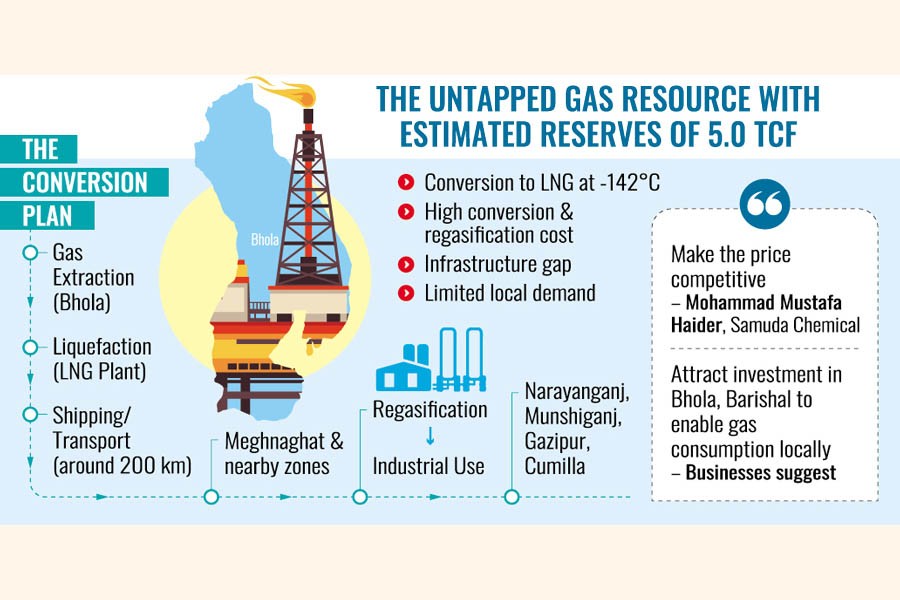The government is struggling to find buyers for the gas discovered in Bhola, as no international firms have shown interest in converting it into liquefied natural gas (LNG) and transporting it to the industrial belt near Dhaka.
The Energy and Mineral Resources Division (EMRD) has taken steps to move the plan forward, but a lack of interested customers continues to stall progress.
Industries in Narayanganj, Munshiganj, Gazipur and parts of Cumilla have long been suffering from an acute gas shortage. Yet, despite Bhola’s promising reserve of over 5.0 trillion cubic feet (tcf) of natural gas, the absence of buyers has kept the initiative in limbo.
Officials say that while Bhola’s resource potential is significant, its limited local consumption has made the gas commercially unattractive.
A senior official at the Energy and Mineral Resources Division said, “We are yet to fully assess the demand side for Bhola gas.”
He explained that Bhola, the country’s largest island in the south-central region, holds a potential gas reserve exceeding 5.0 tcf, although the recoverable portion is expected to be considerably lower.
The challenge, he noted, lies in the island’s small number of local consumers.
“For this reason, the division has proposed converting the gas into LNG and transporting it to Dhaka, where industries have been struggling with a prolonged gas shortage,” the official said.
“We plan to award contracts to international companies that would set up facilities to liquefy the gas and deliver it to the Meghnaghat area.”
However, the official added that local entrepreneurs prefer gas connections from existing facilities rather than through a new LNG-based system.
Industrialists have expressed mixed reactions to the government’s plan. Many agree that significant investment will be required to develop infrastructure capable of receiving and using LNG, and they stress the need for continuity and sustainability in supply.
Anwar Alam Chowdhury Parvez, president of the Bangladesh Chamber of Industries, a body representing over 600 members, told the Financial Express: “We need investment to build facilities that will allow us to use the gas. This will only happen if the government ensures continuity and sustainability of supply.”
He added, however, that many industrial zones lack the necessary land to establish such facilities.
Cement manufacturers, on the other hand, have welcomed the move, urging the government to supply gas directly to end-users instead of involving third parties.
“I welcome the initiative as it will help us expand our facilities,” said Amirul Hoque, president of the Bangladesh Cement Manufacturers Association.
“But the government must eliminate middlemen who distort the market and exploit monopoly practices. Let the government talk to us directly.”
Mohammad Mustafa Haider, managing director of Samuda Chemical Complex Ltd, the country’s largest producer of caustic soda and hydrogen peroxide, said his company has not yet received any proposal regarding the gas.
Located at Gazaria in Munshiganj, near the Meghna river, the plant could be a potential customer if the price is competitive, he said.
Mr Haider, who is also a director of the TK Group, one of Bangladesh’s largest commodity conglomerates, pointed out that converting natural gas into LNG, a process that requires cooling it to around minus 142 degrees Celsius, is costly.
Additional expenses arise when the LNG is regasified for industrial use, making the overall process economically challenging.
Some businesses, however, argue that the government should prioritise attracting investment in Bhola and Barishal to enable local consumption of the gas.
They contend that this approach would remove the need for costly LNG conversion and regasification.
They also note that with the completion of the Padma Bridge, the region is now better connected and has the potential to make a far greater contribution to the national economy.
“We believe the priority should be to expand consumption within areas such as Bhola and Barishal, where the efficient use of natural resources can be ensured,” said one entrepreneur.
jasimharoon@yahoo.com
